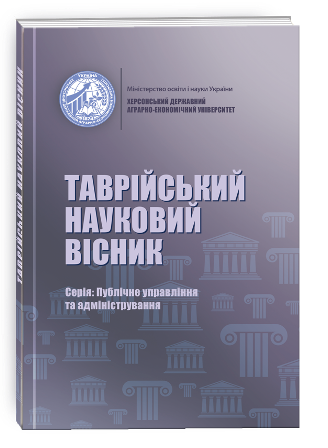PUBLIC MANAGEMENT AND ADMINISTRATION IN THE FIELD OF SPORTS FACILITIES CONSTRUCTION BASED ON A CASE STUDY OF EASTERN COUNTRIES
DOI:
https://doi.org/10.32782/tnv-pub.2024.3.5Keywords:
public management, administration, construction, sports facilities, Eastern countries, UAE, Qatar, Saudi Arabia, Bahrain, innovative technologies, public-private partnershipAbstract
The article explores distinctive features of public management and administration in the field of sports facilities construction using the example of Eastern countries, namely the United Arab Emirates (UAE), Qatar, Saudi Arabia, and Bahrain. Comparative analysis was employed to identify the key success factors in the implementation of sports infrastructure projects. It was discovered that centralized planning, public-private partnerships, adoption of innovative technologies, and investment in human resources are the main factors contributing to successful project delivery. The relevance of the study is driven by the growing interest in the development of sports infrastructure in connection with hosting international sports events, such as the FIFA World Cup and other global sports activities, which require modern and efficient management approaches. The UAE, Qatar, Saudi Arabia, and Bahrain successfully implement innovative solutions and approaches in the construction of sports facilities, which allows them to meet contemporary requirements and stimulates regional economic development. Public administration in these countries encompasses a comprehensive strategy focused on long-term planning and attracting investments, which serves as the foundation for the effective development of sports infrastructure. Moreover, significant attention is given to creating favorable conditions for human resource development which is essential for achieving high standards of facility operation and maintenance. Analyzing best practices of these countries may prove valuable for other nations seeking to improve their sports infrastructure and enhance the standards of hosting international competitions. The primary findings of this research can be applied to develop recommendations for optimizing project implementation and management processes in the sports infrastructure sector in other regions. UAE, Qatar, Saudi Arabia, and Bahrain actively utilize advanced technologies to monitor construction progress, control work quality, and ensure timely task completion. This not only enhances process transparency but also ensures more rational resource utilization. The implementation of such approaches promotes creation of reliable and sustainable sports infrastructure that meets international standards and requirements. Therefore, the expertise of the abovementioned countries serves as a valuable source of knowledge for Ukraine in particular as it strives for substantial progress in the field of sports construction and management in the future.
References
Громенко Д. Є. Формування рекреаційно-туристичних кластерів в контексті сталого розвитку регіонів. 2019.
Гурнак, В., & Ананченко В. Соціально-економічні наслідки проведення міжнародних заходів в Україні. Економіст. 2012. № 9. С. 12–16.
Кіш Г. В., & Нагорняк Г. С. Сучасні реалії функціонування сучасного ринку ресторанного бізнесу в Україні. 2021.
Логвин Д. М. Міжнародний туризм як економічний та соціокультурний феномен. 2021.
Паук М. І. Використання світового досвіду залучення інвестицій в туристичний сектор. Науковий вісник Херсонського державного університету. Сер.: Економічні науки. 2014. Вип. 6 . № 4. С. 61–64.
Постернак К. Історико-культурні ресурси Саудівської Аравії: особливості організації турів для європейців. 2021.
Свинаренко Д . Перспективи розвитку мiжнародного туризму в Украiнi (на прикладi дiяльностi туристичного агенства «Кит» (Master’s thesis, ДВНЗ» Придніпровська державна академія будівництва та архітектури»). 2021.
Черненко В. Р. Сучасні технології обслуговування в діловому туризмі. 2023.
Шовген М. Р. Зарубіжний досвід розвитку індустрії туризму в Україні та його вдосконалення. 2022.







